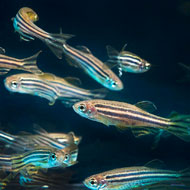
Nature offers therapy for MDR Shigella infections
For the first time, a naturally occurring predatory bacterium has been used to clear multi-drug-resistant (MDR) Shigella infections. Scientists say the discovery is an important step in the fight against superbugs.
Shigella is a common cause of 'traveller's diarrhoea' and causes more than 160 million illnesses and one million deaths each year. Drug-resistant Shigella is on the rise as, although it is usually self-limiting, antibiotics are often used even in mild cases to clear up the symptoms more quickly.
Researchers from Imperial College London and the University of Nottingham believe they have found a creative solution in the natural environment.
Zebrafish larvae were injected with a lethal dose of Shigella flexneri M90T, a strain that is resistant to streptomycin and carbenicillin antibiotics. The predatory bacterium, Bdellovibrio bacteriovorus, was then injected into the larvae's infection site.
The team observed a decrease in the number of Shigella seen. However, without Bdellovibrio, the zebrafish were unable to control the replication of Shigella and the level of bacteria rose.
Bdellovibrio is also able to reduce the pathogen load in immunocompromised zebrafish larvae that are depleted of white blood cells. But survival rates are significantly higher in those that are immune-competent. Researchers say this demonstrates that Bdellovibrio's maximum benefit comes from its ability to work with the host's immune system.
Dr Michael Chew, science portfolio advisor at Wellcome, which provided funding for the study, commented: "It may be unusual to use a bacterium to get rid of another, but in the light of the looming threat from drug resistant infections the potential of beneficial bacteria-animal interactions should not be overlooked.
"We are increasingly relying on last line antibiotics, and this innovative study demonstrates how predatory bacteria could be an important additional tool to drugs in the fight against resistance."
Co-lead authors Dr Serge Mostowy and Dr Alex Willis added: "The urgent requirement for new antimicrobials calls for increasingly creative solutions. The zebrafish has been a fantastic model for us to generate rapid understanding of how a living antibiotic can work in an animal.
"Our findings here provide the basis for testing Bdellovibrio in higher vertebrates and ultimately, humans."
Image by Lynn Ketchum, courtesy of Oregon State University/CC BY-SA 2.0



 The latest
The latest